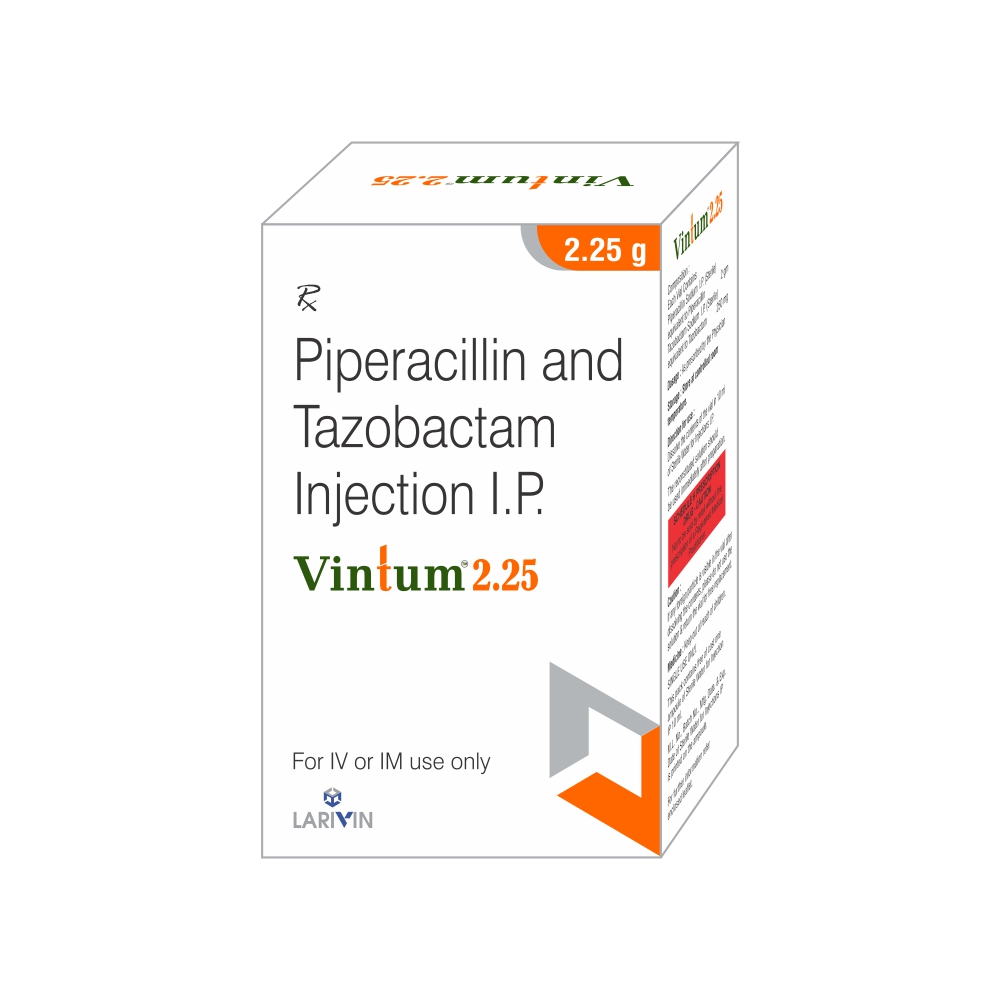- 044-24812581
- Plot No 15, 27th Street, Natesan Nagar, Maduravoyal, Chennai 600095
- +91 7845883586
- info@larivinpharma.com
VINTUM-2.25

Win Tough Infections…
VINTUM 2.25
Piperacillin 2gm & Tazobactam 250 mg (IV) Injection
The Antibiotic with TREMENDOUS POWER
Key Features:
- Piperacillin: Binds to penicillin-binding proteins (PBPs) on the bacterial cell wall, inhibiting cell wall synthesis, which is critical for bacterial growth and survival.
- Tazobactam: A potent extended-spectrum beta-lactamase inhibitor that protects Piperacillin from degradation by beta-lactamase enzymes, extending its activity against resistant bacteria.
- Broad-Spectrum Coverage: Effective against a wide range of aerobic Gram-positive, Gram-negative, and resistant pathogens, including tough-to-kill Pseudomonas species.
- High Safety Profile: Vintum 2.25 is well-tolerated, ensuring patient compliance and effective treatment outcomes.
Indication:
Vintum 2.25 is indicated for the treatment of a variety of severe bacterial infections, particularly those caused by resistant organisms, including:
- Complicated Intra-abdominal Infections: Such as peritonitis and intra-abdominal abscesses.
- Peritonitis: Inflammation of the peritoneum, often due to infection.
- Sepsis: Life-threatening systemic infections that spread throughout the body.
- Diabetic Foot Ulcer: Infections associated with diabetic foot wounds.
- Abscess: Localized collections of pus due to infection.
- Febrile Neutropenia: Treatment of infections in patients with low neutrophil counts, often due to chemotherapy.
- Nosocomial Pneumonia: Hospital-acquired pneumonia, including infections caused by resistant bacteria.
- Burns: Infections associated with burn wounds.
- Ventilator-Associated Pneumonia (VAP): Pneumonia that occurs in patients receiving mechanical ventilation.
Mode of Action:
- Piperacillin: Inhibits bacterial cell wall synthesis by binding to specific penicillin-binding proteins (PBPs) located inside the bacterial cell wall. This action prevents the cross-linking of peptidoglycan chains, which are necessary for bacterial cell wall strength and rigidity, leading to bacterial cell lysis and death.
- Tazobactam: Extends the antibacterial activity of Piperacillin by inhibiting beta-lactamase enzymes that would otherwise degrade Piperacillin. This combination ensures a broader spectrum of activity, particularly against beta-lactamase-producing bacteria.
How to Take Vintum 2.25:
- Administration: Vintum 2.25 is administered as an intravenous (IV) infusion. The preparation and administration should be carried out by a healthcare professional in a clinical setting.
- Dosage Frequency: The standard dosage is 2.25 gm every 8 hours. The exact duration and frequency of treatment depend on the severity of the infection and the patient’s response.
- Reconstitution: The injection should be reconstituted with the appropriate diluent before administration, following the manufacturer’s instructions or healthcare provider’s guidance.
Dosage:
- Standard Dosage: 2.25 gm of Piperacillin/Tazobactam administered every 8 hours via intravenous infusion. The duration of treatment depends on the type and severity of the infection.
Possible Side Effects:
While Vintum 2.25 is generally well-tolerated, some patients may experience side effects. Common side effects include:
- Gastrointestinal Issues: Diarrhea, nausea, vomiting, or abdominal pain.
- Injection Site Reactions: Pain, redness, or swelling at the injection site.
- Headache: Some patients may experience mild to moderate headaches.
- Allergic Reactions: Rash, itching, or hives. Severe allergic reactions (anaphylaxis) are rare but require immediate medical attention.
- Hematologic Changes: Rarely, Piperacillin/Tazobactam may cause changes in blood counts, such as leukopenia, thrombocytopenia, or anemia. Regular monitoring may be required during prolonged therapy.
- Electrolyte Imbalance: Monitor for potential imbalances, particularly in patients receiving long-term therapy.
- Superinfection: Prolonged use of antibiotics can sometimes lead to the overgrowth of non-susceptible organisms, such as fungi.
Precautions:
- Renal Function: Use with caution in patients with renal impairment. Dose adjustments may be necessary, and regular monitoring of renal function is recommended.
- Liver Function: Regular monitoring may be necessary in patients with pre-existing liver conditions.
- Bleeding Risk: Piperacillin may increase the risk of bleeding. Monitor patients for signs of bleeding, especially those on anticoagulants.
- Drug Interactions: Inform your healthcare provider of all medications you are taking, as Piperacillin/Tazobactam can interact with certain drugs, potentially affecting their efficacy.
Consult Your Doctor:
- Before starting Vintum 2.25 if you have any known allergies, particularly to penicillins, cephalosporins, or beta-lactamase inhibitors, or if you have kidney or liver disease.
- If you experience any severe or unusual symptoms, particularly signs of an allergic reaction, gastrointestinal distress, or bleeding.
- For guidance on managing your condition and to discuss any concerns regarding your treatment plan.
Disclaimer: This information is for general knowledge only and should not be considered medical advice. Always consult with a healthcare professional for personalized guidance.
